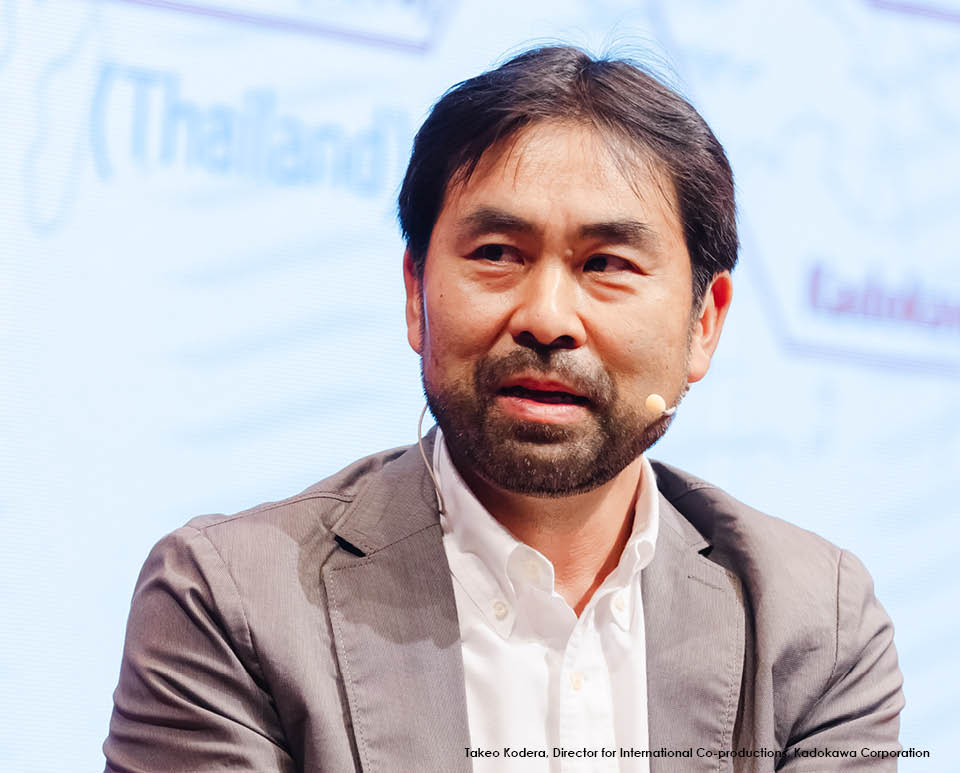
Takeo Kodera, director for international co-productions for Kadokawa Corporation, talks about the Japanese publishing giant’s live action international co-productions and his preferred way of working with partners around the world.
Japanese publishing giant Kadokawa Corporation these days is all about the power of a global media mix. Its sprawling business is structured for global growth, its powerful IP already visible and expanding across diverse media channels. The company continues to create new entertainment content as a source of value, and keeps a keen eye on what it views as the ever-expanding global content market.
As the corporation counts down to its 80th birthday celebrations in 2025, its red carpet visibility at film festivals around the world is high. Its latest film co-production, "La Voie du serpent" ("Serpent’s Path"), screened in competition at the San Sebastián International Film Festival in September. The mystery thriller, co-written and directed by renowned filmmaker Kiyoshi Kurosawa, was also part of the Busan International Film Festival Gala Presentation section in October.
Between 10 and 15 projects are in the works with various partners in different countries, says Takeo Kodera, Kadokawa Corporation’s director for international co-productions. As yet another major anniversary appears on the horizon – the 50th anniversary of Kadokawa’s first film, mystery thriller "The Inugami Family", in 2026 – Kodera says IP and a global outlook are key.
Kadokawa’s eye on markets beyond Japan is not new. This year is the 25th anniversary of Taiwan Kadokawa, which was established in 1999. Taiwan was Kadokawa’s first international outpost. Taiwan was followed by divisions in, among other countries, the U.S., France, Hong Kong and Malaysia. The newest arm is in Korea.
IP expansion is also ongoing. Since its founding by Genyoshi Kadokawa as a publishing company in 1945 after World War II, Kadokawa has also expanded into gaming, e-commerce and education, among other activities.
The early business model developed in the 1970s was to develop films based on books. “As a publisher, of course, we want the audience to read the book and watch the film. Or you watch the film and say, ‘oh, I like this story, may...
Takeo Kodera, director for international co-productions for Kadokawa Corporation, talks about the Japanese publishing giant’s live action international co-productions and his preferred way of working with partners around the world.
Japanese publishing giant Kadokawa Corporation these days is all about the power of a global media mix. Its sprawling business is structured for global growth, its powerful IP already visible and expanding across diverse media channels. The company continues to create new entertainment content as a source of value, and keeps a keen eye on what it views as the ever-expanding global content market.
As the corporation counts down to its 80th birthday celebrations in 2025, its red carpet visibility at film festivals around the world is high. Its latest film co-production, "La Voie du serpent" ("Serpent’s Path"), screened in competition at the San Sebastián International Film Festival in September. The mystery thriller, co-written and directed by renowned filmmaker Kiyoshi Kurosawa, was also part of the Busan International Film Festival Gala Presentation section in October.
Between 10 and 15 projects are in the works with various partners in different countries, says Takeo Kodera, Kadokawa Corporation’s director for international co-productions. As yet another major anniversary appears on the horizon – the 50th anniversary of Kadokawa’s first film, mystery thriller "The Inugami Family", in 2026 – Kodera says IP and a global outlook are key.
Kadokawa’s eye on markets beyond Japan is not new. This year is the 25th anniversary of Taiwan Kadokawa, which was established in 1999. Taiwan was Kadokawa’s first international outpost. Taiwan was followed by divisions in, among other countries, the U.S., France, Hong Kong and Malaysia. The newest arm is in Korea.
IP expansion is also ongoing. Since its founding by Genyoshi Kadokawa as a publishing company in 1945 after World War II, Kadokawa has also expanded into gaming, e-commerce and education, among other activities.
The early business model developed in the 1970s was to develop films based on books. “As a publisher, of course, we want the audience to read the book and watch the film. Or you watch the film and say, ‘oh, I like this story, maybe I want to do more reading’. That was the business model,” Kodera says. The latest global media mix, including games and e-commerce, grew from there.
Japan has been slower than some other markets, particularly in Europe, to embrace film co-production. Kodero says there are a few reasons, beginning with the size of the local box office. Japanese box office is one of the world’s top five.
“The market is not growing, but still it’s a big market. So all the business models have been established,” Kodera says.
According to Box Office Mojo, Japan’s box office to 13 October this year was more than US$700 million. In 2023, box office topped US$1 billion, down about 8% from the previous year’s US$1.12 billion, and down significantly from 2010’s US$2.2 billion. 2020 broke a 17-year streak of annual box office of more than US$1 billion. At just below US$897 million, 2021 recorded the lowest annual box office since 2002.
Language barriers may contribute to a certain reluctance. “Maybe we don’t need to go outside. Nobody speaks Japanese outside of Japan, so communication-wise, the language barrier, the culture barrier... we feel kind of comfortable to keep the business model as is,” he says.
Japanese film funding, production and decision-making systems, where a yes from everyone involved is required, are stable and reliable, but also unique to Japan. This could be another reason Japan has been slower to work with outside groups, Kodera says.
A push into international co-production means fundamental changes to financing and structure, all without the kind of government support or soft money for co-production that exists in other markets.
And then there are production budgets, which are surprisingly low. The average film budget is between US$1 million and US$2 million. Few films – “maybe one a year” – go over US$10 million.
Despite these familiar obstacles, Kodera remains committed to co-production. “I’ve always worked in an international field... and there’s IP to explore. There are people who are interested in doing co-production”.
The wins are worthwhile. Produced by Kodera and David Gauquie, "La Voie du serpent" ("Serpent’s Path") is about a grieving father Albert (played by Damien Bonnard), who enlists Japanese psychiatrist Sayoko (Ko Shibasaki) to exact revenge on members of an organ trafficking organisation involved in the death of his eight-year-old daughter. Kiyoshi Kurosawa wrote the script of the 2024 version with French journalist, Aurelien Ferenczi. The 1998 Japanese original was written by Hiroshi Takahashi ("The Ring"). Kadokawa released the film in Japan in June this year.
Kodera says the new version of "Serpent’s Path" happened over two conversations. “I was talking to Mr Kurosawa about the remake of another movie and he wasn’t that interested,” he says. “Then I asked him, ‘is there any movie you want to remake. And he gave me this one ["Serpent’s Path"]. That was the first conversation,” he says. "Serpent’s Path" is Kurosawa’s first remake of one of his own films.
The second conversation was with Kadokawa’s French partner, Cinefrance Studios. “We were always talking about doing something. You know, lunch and dinner and talking in general... I asked them if they knew Mr Kurosawa. And they said, ‘yes, of course’. They didn’t know "Serpent’s Path"... they watched it and liked it... I talked to Mr Kurosawa, and asked if he would be interested in doing the remake in France. He shot a movie ["Daguerrotype", 2016] in France before and he had a very good experience. He always wanted to come back to France... So he agreed. And that’s how it started.” The film is a co-production between Cinefrance Studios, Kadokawa and Tarantula.
The risks were not insignificant, including lead actress, Ko Shibasaki ("47 Ronin"), who had to memorise lines in a language she doesn’t speak and sound like a native who has been living in France for a decade. Three dialect coaches – two in Japan and one in France – and four or five months later, Shibasaki was ready.
It helped that Kurosawa knows exactly what he wants. “Most of the takes are once only. He’s very precise... Every morning he gives all the direction in Japanese, which is then translated. He gives the order precisely and very clearly and very creatively and interestingly. That’s how all the crew was motivated,” Kodera says.
"Serpent’s Path" was a private co-production co-funded via different channels in Japan and France, rather than part of a formal French-Japanese treaty, with Kadokawa taking sales rights ex France and Belgium. “There is no treaty [with France]. We [Japan] just signed with Italy. Slowly, we are changing.”
Kadokawa has between 10 and 15 projects in various stages of development with partners in different countries, including one that has been commissioned.
“Of course we always try to get the global market,” he says. “I know it’s not easy, but that’s always a target. These days local language products can be in the global market,” he adds, mentioning projects in the U.S., U.K., China, Germany and Korea. “Any project has the potential to go global,” he says.
There’s no expectation of simple conclusions and straight lines to the finish. “Sometimes we’ve been friends, known each other for a long time. Sometimes it’s somebody I don’t know. Then I start with, ‘who are you, why do you want to do this, how do you want to do it’. Those are the three basic questions I always ask. Then we get to know each other, make sure they understand the IP,” he says.
Some elements are simple though. “As the publishing company, the author is very important... Once we feel the offers are good enough to present to the author, we do. Otherwise, the project is not going to happen.”



















